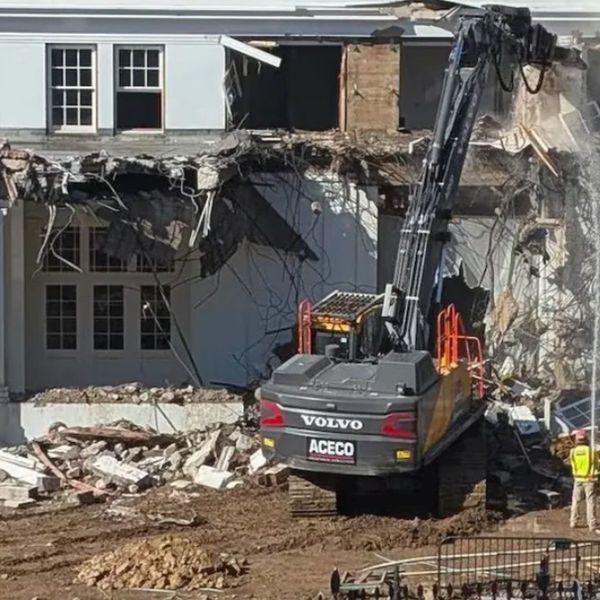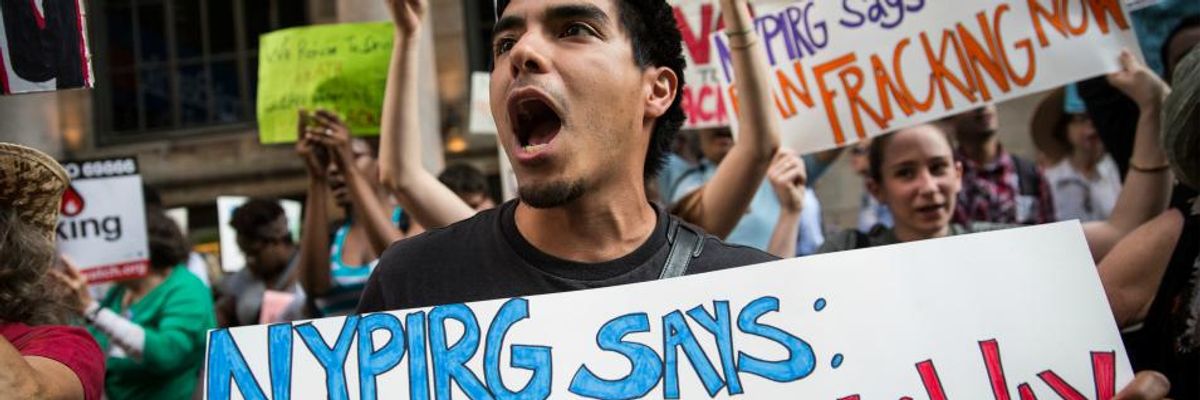The new report includes a growing list of communities, states, and countries around the world that are working to mitigate the human health impacts of fracking, and even ban it altogether. "We've been traveling scientists," Steingraber tells me. "We're bringing the data into frontline communities because the so-called economic benefits stop looking so good when they can't drink water and can't get a new mortgage or kids get nosebleeds or cattle died."
Steingraber hopes the new report, through its sheer numbers of citations, will convince more communities and policymakers that fracking should be banned. She points out how New York state did just that after former Governor David Paterson put Marcellus Shale development and fracking on hold pending a review of its environmental impacts.
"It was enough time for us to gather data and for policy makers to review the evidence and to assess the costs and benefits and to ultimately ban fracking in the state," Steingraber says. "It was a victory for science."
But in neighboring Pennsylvania, one of the nation's top natural natural-gas-producing states, the story is very different. Investigative reporting by the Pittsburgh Post-Gazette has identified at least forty-six children in Fayette, Greene, Washington, and Westmoreland counties who have been diagnosed with rare forms of cancer since 2008, including at least twenty-seven cases of Ewing sarcoma suspected to be linked to fracking activities. In Pennsylvania, some fracking facilities operate within 300 feet of people's homes
Steingraber is a signatory on a letter delivered on June 19 to Pennsylvania Governor Tom Wolf, calling on him to direct the state Department of Health to investigate potential links between fracking and a proliferation of childhood cancers.
Yet the fracking industry remains unmoved by such concerns. "Energy in Depth," a publication of the Independent Petroleum Association of America, for example, describes an earlier compendium of scientific findings--much of which is referenced in Steingraber's more recent report--as "repackaging of the same old discredited fracking studies," and merely presented to media from a "new(ish) angle."
"In certain states, even presented with careful peer-reviewed science, [the industry] tends to push back very hard, maintaining the message that there are no notable impacts on climate, human health or otherwise," says Seth Shonkoff of the energy science and policy institute, PSE Healthy Energy. Shonkoff was not involved in Steingraber's report.
Some states, including California and Colorado, have more successfully worked with industry to create such harm-mitigation strategies as methane reduction rules, emission control technologies, and minimum "setbacks" to protect communities from fracking operations. "It's not at all perfect," Shonkoff says, "but it's heartening to see some take the issue seriously based on the science."
"The so-called economic benefits stop looking so good when people can't drink the water and can't get a new mortgage or kids get nosebleeds or cattle died."
Still, he adds, "much of the industry fights tooth and nail against emission reduction or consideration of minimum setbacks and other mitigating opportunities, and in the face of the growing strength of scientific evidence this seems odd."
Steingraber is hopeful that the increasing number of studies and the care with which the work has been complied and peer reviewed will create enough public awareness and momentum to pressure lawmakers to act. She points to the Oil Money Out campaign pressuring political candidates to refuse money from the fossil fuel industry. The campaign was catalyzed by a scientific study in California revealing the public health and environmental impacts of oil extraction.
Where industry has captured the regulatory agencies and the political leadership, she says, the science can't speak as loudly as it needs to. "This is relevant to climate change and basic public health. We're not just describing neutrons here. It's urgent."


